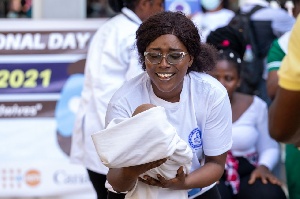Health News of Thursday, 8 May 2025
Source: www.ghanawebbers.com
Investing in midwives to save mothers and babies
Midwives are essential to any nation's health system. They provide 90% of sexual, reproductive, maternal, and newborn health services. This includes family planning and support for survivors of gender-based violence.
Midwives often face great risks to deliver care. They travel to remote areas and crisis settings. Sometimes they cross rivers in boats to reach women and girls. Their work saves lives and protects health rights.
Even during floods or disasters, midwives respond first. They are the last line of defense when infrastructure collapses. Deploying midwives effectively can reduce preventable maternal deaths during crises.
However, midwifery is not always recognized as vital. Midwives lack representation in decision-making processes. Chronic underinvestment leads to inadequate training and low salaries. These barriers worsen during crises.
Globally, there is a shortage of nearly 1 million midwives. This shortage hinders efforts to end preventable maternal deaths. Recent funding cuts threaten humanitarian assistance for women and girls.
Midwives report rising death rates among women and newborns in conflict zones. Over 60% of global maternal deaths occur in these areas.
In Ghana, UNFPA supports quality midwifery education through Centres of Excellence. Selected schools will meet international standards for training.
The Korle Bu Nursing and Midwifery Training College is one site chosen for this initiative. The Kwame Nkrumah University of Science and Technology is another site.
UNFPA Ghana also aids faculty development and governance structures this year.
Working with the Ministry of Health, UNFPA launched the 3rd Nursing and Midwifery Strategic Plan (2024–2028). This plan outlines a roadmap for developing nursing and midwifery professions.
In 2024, UNFPA trained 120 midwives in emergency obstetric care (EmONC). This improves maternal and newborn services across Networks of Practice.
Additionally, UNFPA supported 60 midwives in Long-acting Reversible Contraceptives (LARC).
Dr. Wilfred Ochan from UNFPA Ghana emphasizes strengthening midwifery is urgent. He believes it protects families from preventable maternal deaths.
“Investing in midwives makes communities less vulnerable,” he said. He urged governments to collaborate with UNFPA on the Midwifery Accelerator initiative.
“Together we must increase investments in midwives,” Dr. Ochan added. “Every mother deserves a safe birth.”
Midwives save lives every day. We must address the global shortage of nearly one million midwives together. Let’s ensure their voices are heard in decision-making processes.
We should unify midwifery associations towards a common agenda for better outcomes.











